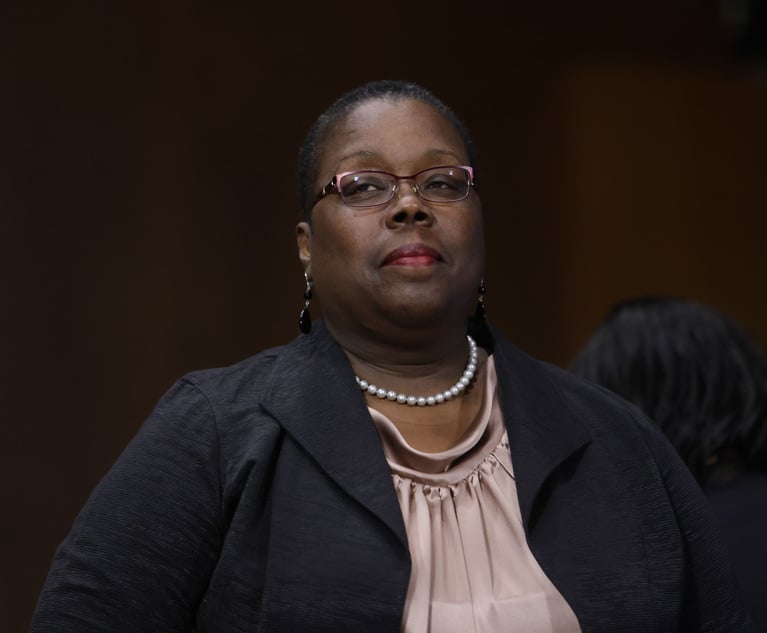Court Says Retail Workers Are Owed Pay for Being 'On Call'
A plaintiffs lawyer representing "on call" employees called the Second District Court of Appeal's ruling a "far-reaching decision and a great day for the wage earners."
February 05, 2019 at 06:31 PM
4 minute read

A California appellate court has held that “on call” workers should be compensated in instances when they aren't ultimately forced to come in to work a shift.
The decision issued Monday by the Second District Court of Appeal in Los Angeles marks the first time a court has weighed in how the state's labor-friendly employee wage orders apply to the practice where workers are assigned on-call shifts but are not told until they call in just hours before they're set to begin whether they should actually report to work or not.
The ruling is a win for plaintiffs lawyers at McNicholas & McNicholas; Frank Sims & Stolper; and Bridgford, Gleason & Artinian who represent a proposed class of workers pursuing reporting time pay from the Irvine-based Tillys chain of retail stores.
“As we explain, on-call shifts burden employees, who cannot take other jobs, go to school, or make social plans during on-call shifts—but who nonetheless receive no compensation from Tilly's unless they ultimately are called in to work,” wrote Presiding Justice Lee Smalley Edmon in Monday's divided panel opinion. ”This is precisely the kind of abuse that reporting time pay was designed to discourage,” wrote Edmon, referring to partial compensation employees receive for who report to work, but are deprived of hours.
Bridgford Gleason name partner Richard Bridgford called the opinion a ”far-reaching decision and a great day for the wage earners.”
“It's a move to level the playing field and acknowledge the realities of the digital age in which we live,” Bridgford said. “It's easier now for an employer to reach an employee—whether it be by email, cellphone. social media post of some type—and to tie up that wage earner's time in a way that prevents the wage earner from seeking other employment or enjoying their free time.”
The lead plaintiffs in the case, former Tillys employee Skylar Ward, sued in 2015 claiming that the retailer's practice of having workers call in two hours prior to “on call” shifts violated California Wage Order 7-2001. The wage order requires employers to pay employees “reporting time pay” when “an employee is required to report for work and does report, but is not put to work or is furnished less than half said employee's usual or scheduled day's work.”
Tillys lawyers at O'Melveny & Myers convinced the trial court below to toss the complaint, arguing that “reporting for work” requires an employee to be physically present at the workplace at the start of a scheduled shift.
But in reviving the lawsuit Monday, the Second District majority concluded that a worker need not physically appear at the workplace, but only “present[] oneself as ordered.”
In a partial dissent, Justice Anne Egerton wrote that “legislative history of the phrase 'report for work' reflects the drafters' intent that―to qualify for reporting time pay―a retail salesperson must physically appear at the workplace: the store.” Egerton wrote that it should be up to the legislature to extend “report for work” pay to “on call” workers, not the court.
O'Melveny's Adam Karr, who argued the case for Tillys at the Court of Appeal, passed along a statement from the company, which said that Tillys is reviewing the decision, “which was made in the context of a motion to dismiss before any factual discovery and when all of the plaintiffs' allegations were presumed to be true.”
“Tilly's respectfully disagrees with the two of three judges who decided the appeal in favor of the plaintiffs,” the company statement said. “Tilly's is confident that its practices will be found fair and lawful, either upon further appellate review of this decision or by the trial court upon remand.”
A team from Greenberg Traurig filed an amicus brief on behalf of Abercrombie & Fitch Stores Inc. backing Tillys on appeal.
This content has been archived. It is available through our partners, LexisNexis® and Bloomberg Law.
To view this content, please continue to their sites.
Not a Lexis Subscriber?
Subscribe Now
Not a Bloomberg Law Subscriber?
Subscribe Now
NOT FOR REPRINT
© 2024 ALM Global, LLC, All Rights Reserved. Request academic re-use from www.copyright.com. All other uses, submit a request to [email protected]. For more information visit Asset & Logo Licensing.
You Might Like
View All
Pre-Internet High Court Ruling Hobbling Efforts to Keep Tech Giants from Using Below-Cost Pricing to Bury Rivals
6 minute read
Amazon's Audible Hit With Privacy Class Action Over Use of Tracking Pixels

Meet the Pacific Northwest Judges Who Rejected the Kroger-Albertsons Supermarket Merger
4 minute read
Albertsons Gives Up on $25B Merger, Sues Kroger Seeking 'Billions of Dollars'
Trending Stories
- 1Senate Confirms Last 2 of Biden's California Judicial Nominees
- 2Morrison & Foerster Doles Out Year-End and Special Bonuses, Raises Base Compensation for Associates
- 3Tom Girardi to Surrender to Federal Authorities on Jan. 7
- 4Husch Blackwell, Foley Among Law Firms Opening Southeast Offices This Year
- 5In Lawsuit, Ex-Google Employee Says Company’s Layoffs Targeted Parents and Others on Leave
Who Got The Work
Michael G. Bongiorno, Andrew Scott Dulberg and Elizabeth E. Driscoll from Wilmer Cutler Pickering Hale and Dorr have stepped in to represent Symbotic Inc., an A.I.-enabled technology platform that focuses on increasing supply chain efficiency, and other defendants in a pending shareholder derivative lawsuit. The case, filed Oct. 2 in Massachusetts District Court by the Brown Law Firm on behalf of Stephen Austen, accuses certain officers and directors of misleading investors in regard to Symbotic's potential for margin growth by failing to disclose that the company was not equipped to timely deploy its systems or manage expenses through project delays. The case, assigned to U.S. District Judge Nathaniel M. Gorton, is 1:24-cv-12522, Austen v. Cohen et al.
Who Got The Work
Edmund Polubinski and Marie Killmond of Davis Polk & Wardwell have entered appearances for data platform software development company MongoDB and other defendants in a pending shareholder derivative lawsuit. The action, filed Oct. 7 in New York Southern District Court by the Brown Law Firm, accuses the company's directors and/or officers of falsely expressing confidence in the company’s restructuring of its sales incentive plan and downplaying the severity of decreases in its upfront commitments. The case is 1:24-cv-07594, Roy v. Ittycheria et al.
Who Got The Work
Amy O. Bruchs and Kurt F. Ellison of Michael Best & Friedrich have entered appearances for Epic Systems Corp. in a pending employment discrimination lawsuit. The suit was filed Sept. 7 in Wisconsin Western District Court by Levine Eisberner LLC and Siri & Glimstad on behalf of a project manager who claims that he was wrongfully terminated after applying for a religious exemption to the defendant's COVID-19 vaccine mandate. The case, assigned to U.S. Magistrate Judge Anita Marie Boor, is 3:24-cv-00630, Secker, Nathan v. Epic Systems Corporation.
Who Got The Work
David X. Sullivan, Thomas J. Finn and Gregory A. Hall from McCarter & English have entered appearances for Sunrun Installation Services in a pending civil rights lawsuit. The complaint was filed Sept. 4 in Connecticut District Court by attorney Robert M. Berke on behalf of former employee George Edward Steins, who was arrested and charged with employing an unregistered home improvement salesperson. The complaint alleges that had Sunrun informed the Connecticut Department of Consumer Protection that the plaintiff's employment had ended in 2017 and that he no longer held Sunrun's home improvement contractor license, he would not have been hit with charges, which were dismissed in May 2024. The case, assigned to U.S. District Judge Jeffrey A. Meyer, is 3:24-cv-01423, Steins v. Sunrun, Inc. et al.
Who Got The Work
Greenberg Traurig shareholder Joshua L. Raskin has entered an appearance for boohoo.com UK Ltd. in a pending patent infringement lawsuit. The suit, filed Sept. 3 in Texas Eastern District Court by Rozier Hardt McDonough on behalf of Alto Dynamics, asserts five patents related to an online shopping platform. The case, assigned to U.S. District Judge Rodney Gilstrap, is 2:24-cv-00719, Alto Dynamics, LLC v. boohoo.com UK Limited.
Featured Firms
Law Offices of Gary Martin Hays & Associates, P.C.
(470) 294-1674
Law Offices of Mark E. Salomone
(857) 444-6468
Smith & Hassler
(713) 739-1250






